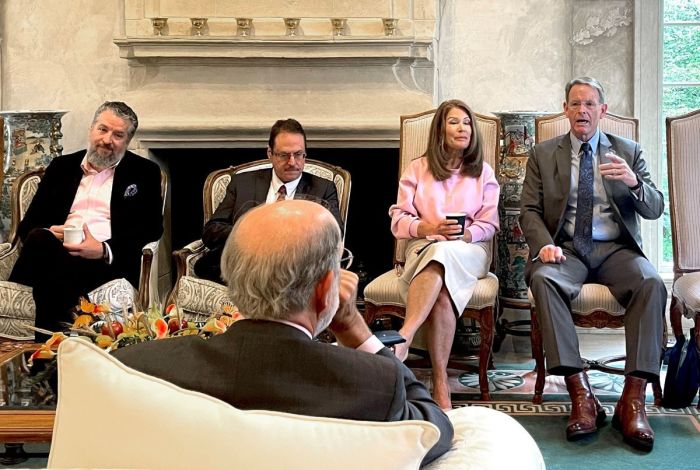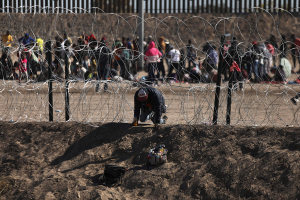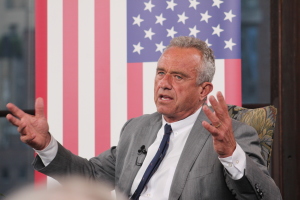Evangelical leaders huddle in DC to discuss how to best stand with the Jewish state

Nearly 100 Evangelical leaders have decided to launch a new organization called the Conference of Presidents of Christian Organizations in Support of Israel.
Among them are:
Tony Perkins, president of the Family Research Council
former Rep. Michele Bachmann, who serves as the Dean of the Robertson School of Government at Regent University
Luke Moon, the new executive director of The Philos Project; and
Pastor Mario Bramnick, president of the Latino Coalition for Israel.
Together, these four helped organize the strategy meetings on September 17 and 18.
They want the group to serve as an umbrella organization for dozens of like-minded groups to come together and magnify their influence by working more closely together.
That, says the organization, would be patterned after the Conference of Presidents of Major Jewish Organizations which for decades was run by Malcolm Hoenlein.
Enthusiastically supporting this new Evangelical version of the conference are prominent Jewish leaders who attended the opening session on Tuesday evening.
Among those speaking were:
David Friedman, former U.S. ambassador to Israel
Elan Carr, who served as the U.S. special envoy for Combating Anti-Semitism, who is now president of the Israeli American Council
Brooke Rollins, the president of America First Policy Institute
Caroline Glick, an Israeli American columnist for the Jewish News Service and a longtime ally of Israeli Prime Minister Benjamin Netanyahu
Is the Conference the right model?
Every Evangelical leader who attended the two days of strategy meetings agreed that a far more focused and unified effort to support Israel must be made.
But not everyone was convinced that the “Conference” of Jewish presidents was the right model.
I found a great deal of respect for Hoenlein, his decades of leadership of the “Conference,” and his many years of “faith diplomacy,” organizing and leading delegations of major Jewish leaders to meet privately with Netanyahu and other senior Israeli leaders as well as with a wide range of Arab and Muslim leaders.
Yet both in the meeting and among private conversations, many Evangelicals raised concerns about the divided and unwieldy nature of the “Conference.”
They noted that many Jewish organizations involved are quite left-of-center, often having major disagreements with each other on policy, as well as profound disagreements with Netanyahu on how best to advance and navigate U.S.-Israeli relations.
What's the right way to expand the influence of 'American Christian Leaders for Israel'?
Several other important questions were raised early and dominated much of the strategy meeting.
One was this: Why would a Christian version of the Conference be necessary when an excellent pro-Israel umbrella organization already exists?
American Christian Leaders for Israel (ACLI) — an initiative of the International Christian Embassy of Jerusalem (ICEJ) — was established more than a decade ago and is supported by more than 3,000 Evangelical and other pastors and ministry leaders.
ACLI is coordinated by Dr. Susan Michael, a highly respected faith leader who is the U.S. Director of ICEJ and has been active in mobilizing Christian support for Israel in the United States for more than 35 years.
She attended the strategy meetings and expressed her agreement that much more needs to be done and that she’s always happy to help advance the cause in unity with a wide range of leaders and organizations.
But Michael was not alone in trying to understand what the benefits would be of starting a new coalition from scratch.
Both in the meetings and afterward, Perkins, Bachmann, Bramnick and Moon agreed that it was vital to talk more with ACLI and find ways to coordinate closely and not duplicate efforts.
Some of those present suggested that perhaps the new Evangelical “Conference” should create a “Cabinet” or steering committee of a dozen or so of the most influential pro-Israel leaders in the Evangelical community that would be responsible for shaping policy, mobilizing the grassroots, and speaking in the media and in Washington for the broader Evangelical community on Israel and Middle East issues.
Where are Rev. John Hagee and Christians United for Israel?
Another important question was discussed: Where is Christians United For Israel (CUFI), the organization founded by the Rev. John Hagee that boasts that it is “the largest pro-Israel organization in the United States, with over 10 million members.”
Since Oct. 7, Hagee has appeared on Fox News to talk about Israel.
Hagee also spoke at a pro-Israel rally in Washington last November organized by the Jewish Federation.
Last month, CUFI launched a campaign to combat antisemitism.
Yet numerous Evangelical leaders who attended the strategy meetings said they have been baffled that Hagee and CUFI have not been much higher profile — and much more aggressive — in wielding their political muscle in defense of Israel over the past year.
Senior CUFI leaders were invited to attend the Washington gathering but did not attend or send a representative.
“I’m not sure where CUFI is these days, but they seem strangely quiet in the greatest fight of Israel’s modern existence,” one Evangelical, who asked not to be named to be able to speak candidly, told me. “None of us understand what’s going on but their absence has created a vacuum of leadership.”
What is the best and right way forward for pro-Israel Christians?
It is this very vacuum of leadership among pro-Israel Evangelicals that prompted these strategy meetings in Washington in the first place.
Rev. Johnnie Moore, president of The Congress of Christian Leaders, attended the meetings and participated in the discussions as an observer.
Though at this point he hasn’t chosen to become officially involved in the new Evangelical “Conference,” Moore expressed his commitment to help any like-minded group working to fight the grave resurgence of antisemitism, including those who mask their antisemitism in anti-Zionism.
Moore told me he was grateful that Perkins, Bachmann, Bramnick and Moon organized these meetings and he agreed that Christian Zionists urgently need to up their game.
However, he noted that there was not yet a unified consensus among those he spoke with on the best path forward.
“This is one of a number of similar initiatives being organized all over the world where the leaders of millions of Evangelicals are asking, ‘What more can we do?’” Moore told me.
“Each initiative is slightly different, involving slightly different priorities and groups, but they are all united in one clear conviction: it’s time for hundreds of millions of Evangelicals to get organized,” he said.
“It’s time to make it clear to their elected representatives — and also to antisemites from the street corners to the UN General Assembly — that picking a fight with Israel or the Jewish community is picking a fight with hundreds of millions of Christians and we won’t stand for it. You have to get through us to get to our Jewish neighbors.”
Joel C. Rosenberg lives in Jerusalem and is the Editor-in-Chief of ALL ISRAEL NEWS and ALL ARAB NEWS, a New York Times best-selling author, Middle East analyst and Evangelical leader.




























